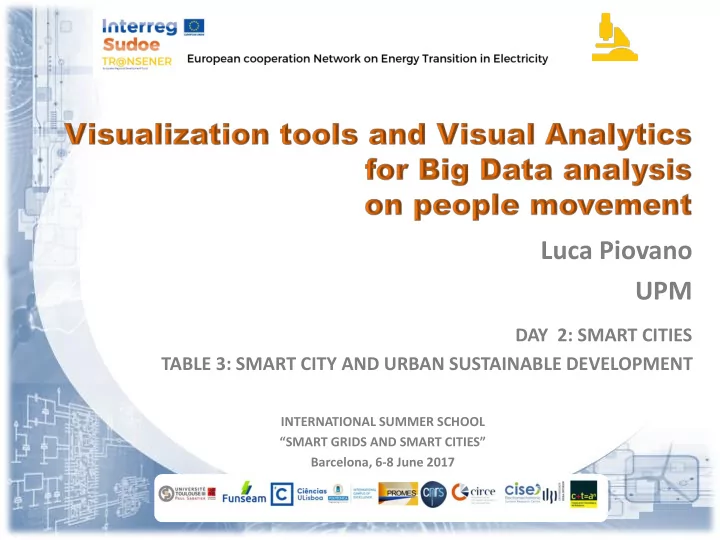

Luca Piovano UPM DAY 2: SMART CITIES TABLE 3: SMART CITY AND URBAN SUSTAINABLE DEVELOPMENT INTERNATIONAL SUMMER SCHOOL “SMART GRIDS AND SMART CITIES” Barcelona, 6-8 June 2017
A bi-dimensional representation of several data types: size of Napoleon’s army, geographical context (distances, notable places), direction of the troops march, temporal references, temperatures Charles Minard (1869 - Lithograph, 62 x 30 cm ) - https://en.wikipedia.org/wiki/Charles_Joseph_Minard 2
What we ask to our data: • explain and classify events; • interpret facts; • detect patterns; • solve problems; • find / propose solutions; • take decisions; • look at the past, explain the present, predict the future • … The Economist cover (Feb 25 th , 2010): http://www.economist.com/node/15579717. 3 Image retrieved on internet
What we are looking for: • summarise information / simplify the complex; • obtain insights from massive, dynamic, ambiguous, and often conflicting data; • detect the expected and discover the unexpected; • provide timely, evidence-based, and understandable analysis; • communicate actionable assessments effectively The Economist cover (Feb 25 th , 2010): http://www.economist.com/node/15579717. 4 Image retrieved on internet
The science of analytical reasoning facilitated by interactive visual interfaces Analytical reasoning = Data → information → knowledge → decisions IEEE Computer Society 2005 Eurographics 2010 http://nvac.pnl.gov/ http://www.vismaster.eu/book 5
6
7
Human thinking – a composite process: • perception + imagination + abstraction + experience + adaptation + … But only human thinking is often insufficient: • processing and storing limitations, difficulty in grasping high dimensionality, sensibility to external factors, slowness, … Visualisation is essential to access the doors of knowledge VA helps with problems hard to be solved algorithmically: • ill-defined, involving incomplete and/or uncertain and/or conflicting data 8
• Cities are complex systems where the global picture of the urban dynamics is given by the sum of several, evolving and intermingled networks; • The way people create social interactions, give functionalities to the architecture, benefit from services and infrastructures, or connect different areas of the urban fabric introduces a further level of complex dynamics being often difficult to grasp. 9
• The increasing penetration of modern ICT technologies enriches and improves traditional data sources, in terms of variety, accessibility, topic coverage, reliability, and completeness; • “The connections between data and decisions are built one good question at a time until understanding bridges the gap between them” (Few, 2009) • Data visualisation approaches should be more and more integrated within decision support tools for urban and regional policy assessment and collaborative planning. 10
Geographical context (e.g. spatial coordinates) • Location-based social networks; Temporal attributes • Mobile devices (call, text, app activity, …); Other dimensions • Digital commercial transactions; Spatial event • Network devices and sensors; Spatial-time series Flows • Transport information; Trajectories • Policy simulators; Dynamic (most of them) • Public datasets (including census) Big volume and variety • … Intra- and inter-inconsistencies 11
• Regulation of urbanisation and policy making as key drivers to mobility study: – Transport infrastructure – Administrative services – Tourism • Mobility has an environmental impact: – Greenhouse gas emissions – Energy efficiency – Land usage and distribution; housing • Mobility has security and healthcare repercussions: – Safety (e.g. personal, road traffic) – Pandemics 12
customer movements: • GOAL: to analyse customer displacements for shopping (consecutive purchases); • DATA: sample of e-transactions (period of 8 weeks); • HOW: highlight spatial relationships in a OD matrix 13
People density: • GOAL: to represent people distribution in Barcelona at different time ranges • DATA: elaboration of CDRs • HOW: choropleth map to emphasize spatial distribution / bar chart to reveal time patterns 14
Trip analysis: • GOAL: to characterise (and forecast) the possible demand of a highway in the Spanish region of Andalusia; • DATA: elaboration of CDR records; 15 • HOW: trip segmentation by OD, hour, and purpose
• Data Fusion: • Enrich data coming from different sources; • Interfaces / tools for visual exploration; • Models improvement; • Data literacy: • Train high-skill level professional to properly use and understand data AND visualisation domains; • Make data visualisation as one of the main pillars in every domain • Ubiquitous IV/VA (through Mixed and Augmented Reality?) • Represent data on real environments; • Integration with widespread sensors 16
Luca Piovano Researcher lpiovano@cedint.upm.es +34 91 452 49 00 (Ext. 1747)
Recommend
More recommend